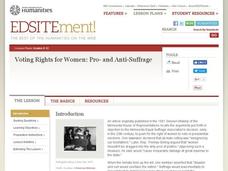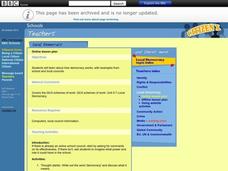North Carolina Civic Education Consortium
The Nineteenth Amendment
Beginning with an exercise of favoritism to engage learners, progressing through image and primary source analysis of the Nineteenth Amendment and the Seneca Falls Declaration, and culminating in a look at a political cartoon called...
PBS
Mark Twain: Storyteller, Novelist, and Humorist
Scholars investigate the use of satire in Mark Twain's writing. Literary lovers research the Adventures of Huckleberry Finn and Tom Sawyer, political cartoons, and videos to see how Twain uses satire to make the stories more memorable....
Smithsonian Institution
A New America: The Hart-Celler Immigration Act of 1965
Many dream of coming to America, but few may enter. The lesson explores the Hart-Celler Immigration Act of 1965 and how it changed immigration policies in the United States. Academics learn how immigration quotas impacted Western Europe...
Center for History Education
Speaking Freely In the Soviet Union's Autocratic Government
Speak your mind! The instructional activity explores the difference in free speech between the United States and the Soviet Union. Academics review the constitutions of both governments, political cartoons, and case studies to understand...
Curated OER
A Day in the Life: Studying Ancient Rome
Class members use their knowledge of Ancient Rome to write articles for an online newspaper. Using WebBlender, learners craft articles that feature Roman politics, culture, and leisure activities.
City University of New York
Jim Crow and the Fight for Civil Rights
The history of voting rights in America has always been rocky, especially in the time period after the Civil War. Learn about the ways that Jim Crow laws affected the voting rights of African Americans with a lesson featuring primary...
Federal Reserve Bank
The Free Silver Movement and Inflation
Why are US dollars no longer backed by gold and silver? What is our medium of exchange, and what would it be like to live in a barter economy? Learners consider these questions, as well as learn about the major historical events in the...
Curated OER
The Jury's Still Out
Students examine the trials and executions of Nicola Sacco and Bartolomeo Vanzetti. In groups, they use the internet to research the impact of the executions in the shape of political cartoons and writings. They discuss an article to...
Curated OER
Reconstruction to Civil Rights
Eighth graders complete a unit of lessons on the period of time from Reconstruction to the Civil Rights movement. They analyze and interpret political cartoons and editorials, conduct research on famous civil rights places, and complete...
Curated OER
West Virginia State Museum Lesson Plan
Students explore historic West Virginia. In this US history lesson, students examine primary sources and political cartoons that depict the issues of statehood for West Virginia and the role that those played in the Civil War. This...
Alabama Department of Archives and History
Alabama and the Treaty of Versailles
As part of a study of the treaty that ended World War I and the seeds of resentment it planted, class groups compare President Wilson's Fourteen Points and the articles of the Treaty of Versailles.
Curated OER
Fighting Fire With Satire
Students consider satire in the news by exploring various sources of "fake news," and then creating their own political satire in the form of a skit, news article, or cartoon.
Curated OER
Progressive Movement in Nebraska and the United States
Students interact with the whole progressive movement and its impact on the U.S. They list the goals of the movement. In addition, they organize primary resources and interpret political cartoons. Each student shares one of their...
Curated OER
Mosaic America on Film: Fact Versus Fiction
Seventh graders define race, ethnic group, and culture. They identify the ways in which words are used in political cartoons and examine the way visual elements in a cartoon determine the meaning of words and enhance their impact. They...
Curated OER
Read All About It!
Students research and develop a newspaper based on the day they were born. For this newspaper lesson, students write an editorial, look for a political cartoon, draw a visual and find music from that year. Students type their...
Curated OER
Major Events Leading to the American Revolution
Students explore the causes of the American Revolution. For this taxation without representation lesson, students analyze political cartoons in order to gain an understanding of the efforts of the colonists to resolve conflict with...
Curated OER
The Great Depression
Seventh graders investigate the implications of economic fallout. In this Great Depression instructional activity, 7th graders analyze political cartoons and documents about the era. Students then conduct further primary source research...
Curated OER
Voting Rights for Women: Pro- and Anti-Suffrage
Students examine the arguments for and against suffrage for women in the 19th and early 20th centuries. They explore various websites, read and discuss primary source documents, develop a document from two points of view, and analyze...
National Endowment for the Humanities
“Read All About It”: Primary Source Reading in “Chronicling America”
Can investigative journalism become too sensationalistic and accusatory, or is it vital for the survival of a democracy? Middle schoolers analyze primary source documents from early 20th-century newspapers as well as Theodore Roosevelt's...
Roy Rosenzweig Center for History and New Media
Immigration: Why Come to the United States?
Don't limit your curriculum to texts! Young historians listen to a song, read an interview, and examine a cartoon as they explore motivations for immigrating to the US in the late 19th and early 20th centuries.
Roy Rosenzweig Center for History and New Media
Reconstruction
When slavery ended, what did the government do to help African American during Reconstruction? An interesting instructional activity uses primary sources such as newspaper articles to help scholars analyze Reconstruction policies and how...
BBC
Local Democracy
Middle and high schoolers explore how democracy works. After a teacher-led discussion, pupils go to websites embedded in the plan which lead them through activities that are all about the democratic process. The first website has them...
Curated OER
The Union is Perpetual: Lincoln is Elected
Students view primary documents about the race for President in the time of Abraham Lincoln. In this election lesson, students prepare arguments for and against Lincoln using an analysis sheet. Students create a poster or cartoon to...
Curated OER
Analyzing Civil War Pictorial Envelopes
Students explore the power of political messages contained in visual artifacts and examine the political messages conveyed by the illustrations that appeared on personal stationery used during the Civil War. They create and describe a...
Other popular searches
- Civics Political Cartoons
- Analyzing Political Cartoons
- Wwii Political Cartoons
- Drawing Political Cartoons
- Danish Political Cartoons
- 1990's Political Cartoons
- New Deal Political Cartoons
- History Political Cartoons
- Thomas Nast Political Cartoons
- Current Political Cartoons
- Civil War Political Cartoons
- Analysis of Political Cartoons

























